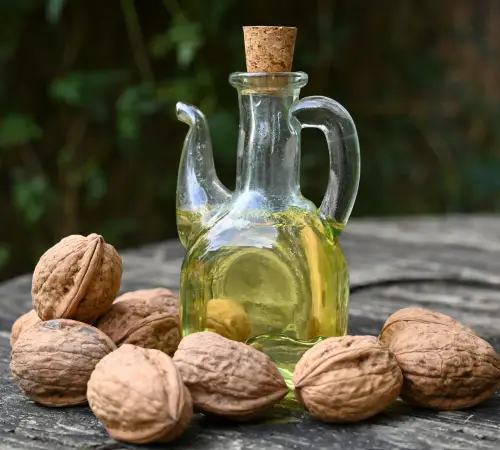
Category: Carrier Oils
Walnut oil, extracted from walnuts (Juglans regia), is a versatile oil rich in polyunsaturated, monounsaturated, and saturated fats. Its primary component is linoleic acid (60–62%), and it also contains beneficial antioxidants like γ-tocopherol, tannins, and flavonoids. Known for its delicate, nutty flavor, walnut oil is often used in cold dishes such as salad dressings but is less commonly used for high-heat cooking due to its cost and sensitivity to heat, which can affect its flavor. Cold-pressed walnut oil, produced with minimal processing, is more expensive but retains higher quality, while refined walnut oil is extracted with solvents to maximize oil yield. Walnut oil is also prized as a drying oil in the art world for its ability to form strong, flexible films, making it ideal for oil paints and varnishes. In woodworking, walnut oil is favored as a safe, edible finish for implements like wooden bowls, often mixed with beeswax to create a durable, non-rancid coating. Culinary Uses Walnut oil is prized for its delicate, nutty flavor and is commonly used in cold dishes like salad dressings. It is less suitable for high-temperature cooking due to its sensitivity to heat, which can alter its taste Cold-Pressed vs Refined Cold-pressed walnut oil retains its high quality but is more expensive. Refined walnut oil, extracted with solvents, yields more oil but undergoes additional processing to remove the solvents. Art and Varnishes Due to its drying oil properties, walnut oil is used in oil paints and varnishes. It polymerizes when exposed to air, forming strong, flexible films, and was a favorite among Renaissance painters. Woodworking Walnut oil is commonly used as a finish for wooden kitchenware, such as bowls, due to its safety and edibility. When mixed with beeswax, it creates a durable, non-rancid coating ideal for wood finishes
Juglans



